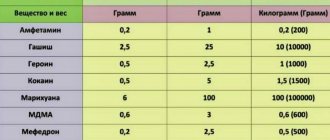ST 231 of the Criminal Code of the Russian Federation.
1. Illegal cultivation on a large scale of plants containing narcotic drugs or psychotropic substances or their precursors is punishable by a fine in the amount of up to three hundred thousand rubles or in the amount of the wages or other income of the convicted person for a period of up to two years, or by compulsory labor for a term of up to four hundred thousand. eighty hours, or restriction of liberty for a term of up to two years, or imprisonment for the same term.
2. The same acts committed: a) by a group of persons by prior conspiracy or by an organized group; b) has become invalid; c) on an especially large scale - is punishable by imprisonment for a term of up to eight years, with or without restriction of freedom for a term of up to two years.
Note : Large and especially large cultivation of plants containing narcotic drugs or psychotropic substances or their precursors, for the purposes of this article, are approved by the Government of the Russian Federation.
Commentary to Art. 231 Criminal Code
1. The subject of the crime is plants containing narcotic drugs or psychotropic substances or their precursors. The list of plants, their significant, large and especially large sizes are indicated in Decree of the Government of the Russian Federation of November 27, 2010 N 934.
2. Cultivation of narcotic plants - activities related to the creation of special conditions for sowing and growing narcotic plants, as well as their sowing and cultivation, improving cultivation technology, breeding new varieties, increasing productivity and resistance to adverse meteorological conditions (Article 1 of the Federal Law dated January 8, 1998 N 3-FZ “On narcotic drugs and psychotropic substances”).
3. The objective side of the crime can be expressed in the commission of one of the actions that make up the concept of “cultivation”. On the nature of these actions, see paragraph 29 of the Resolution of the Plenum of the Supreme Court of the Russian Federation of June 15, 2006 No. 14. Actions must be performed illegally, i.e. in violation of the order established by the legislation of the Russian Federation.
What does judicial practice show under this article?
When cultivating narcotic plants, the Criminal Code of the Russian Federation applies Article 231. It is often used, as many people seek to grow illicit plants to obtain drugs for the purpose of using or selling them.
Examples of cases:
- Citizen G. grew hemp on his plot of land outside the city. Afterwards, he dried it, crushed it and made cigarettes or sold the powder to drug addicts for smoking. He was tracked down and detained. Over 100 cannabis bushes were found on the site. This was recognized as large in size and became the reason for initiating a criminal case. Additionally, his actions were classified as drug sales. The court made a guilty verdict, G. was imprisoned for 6 years.
- Citizen M. was engaged in floriculture and grew various flowers. She came across a poppy in one of the packets of seeds. She didn’t know it was prohibited, so she imprisoned him. In the summer, the investigation carried out a check on the land plots of the population and saw poppy bushes on the citizen’s property. Since there were not many of them (3 pieces), this did not become the basis for initiating a criminal case. They interviewed the citizen, gave her a warning and ordered her to pull out the bushes. She did just that.
- Citizen V. was growing opium poppy in his garden. He had 4 acres of land, which he planted all with poppy seeds, after which he began cultivating it, drying it and making narcotic substances. Neighbors complained about him, the investigation checked his actions and found out that they were illegal. Since the bushes were grown on a large scale, V. was prosecuted. He was imprisoned for 7 years.
What decisions are most often made under Article 231?
This article is often used because citizens want to benefit from growing narcotic plants. In 2022, there were 655 cases under article 231, of which more than 500 were in the first part. 46 people were deprived of their freedom, 127 were conditionally deprived of it, 49 received restriction of freedom, 193 received a fine, 2 received correctional labor, and 234 received compulsory labor. Another 3 were declared insane.
Second commentary to Art. 231 of the Criminal Code of the Russian Federation
1. The subject of the crime in question is, firstly, plants prohibited for cultivation in Russia (opium poppy, coca bush, khat), and secondly, certain varieties of hemp, poppy and other plants, the cultivation of which is prohibited for the purpose of illegal consumption or use in illicit trafficking of narcotic drugs (for example, oilseed and other varieties of poppy, Indian, South Chuyskaya, South Arkhonskaya, Krasnodar, Central Russian and other varieties of hemp).
2. The list of plants prohibited for cultivation is established by the Decree of the Government of the Russian Federation of November 27. 2010 No. 934".
3. The cultivation of narcotic plants “should be understood as activities related to the creation of special conditions for sowing and growing narcotic plants, as well as their sowing and cultivation, improving cultivation technology, breeding new varieties, increasing productivity and resistance to adverse meteorological conditions” (clause 29 of the resolution of June 15, 2006).
4. Sowing of plants prohibited for cultivation means sowing seeds or planting seedlings without proper permission on any land plots, including empty lands. In this case, the crime is considered completed from the moment of sowing, regardless of the subsequent germination or growth of plants.
5. Growing plants prohibited for cultivation means caring for crops and seedlings in order to bring them to a certain stage of maturation (watering, fertilizing, weeding, etc.). The crime in this form is considered completed from the moment the first actions to grow the relevant crops are committed.
6. The subsequent production of narcotic drugs from grown plants containing narcotic substances is not covered by Art. 231 of the Criminal Code and requires additional qualifications under Art. 228 of the Criminal Code as illegal acquisition of narcotic drugs. The same applies to other actions provided for in Art. 228 and 228.1 of the Criminal Code.
7. Illegal cultivation of plants containing narcotic drugs or psychotropic substances or their precursors is a crime only on a large scale.
8. The subjective side of the crime is characterized by direct intent.
9. Responsibility upon reaching the age of 16 years.
10. A crime is recognized as committed by a group of persons by prior conspiracy or by an organized group under the circumstances described in Part 1. 2 or 3 tbsp. 35 of the Criminal Code. The actions of participants in an organized group are qualified under paragraph “a” of Part 2 of Art. 231 of the Criminal Code, regardless of their role. The second qualifying feature (item “c”) is especially large size.
11. Large and extra large size in accordance with the note to Art. 231 of the Criminal Code should be established on the basis of the rules approved by the Decree of the Government of the Russian Federation of November 27. 2010 No. 934.
Official website of the authorities of the Municipal Municipality "Selenginsky District"
Read on and you will have some idea of the penalties provided for by Russian legislation for offenses and crimes in the field of drug trafficking.
Illicit drug trafficking refers to illegal actions related to the storage, production, cultivation of drug-containing plants, consumption or inducement to use drugs, and the maintenance of dens.
– this is their consumption without a doctor’s prescription!!!
LAW AND RESPONSIBILITY
Administrative responsibility:
In accordance with the Code of the Russian Federation “On Administrative Offenses” (CAO RF), a person who has reached the age of 16 at the time of committing an administrative offense is subject to administrative liability. If a person has not reached the age of 16, his parents or legal representatives are subject to administrative liability (Articles 20.22 and 5.35 of the Code of Administrative Offenses of the Russian Federation).
Article 6.8. Code of Administrative Offenses of the Russian Federation. Illegal trafficking of narcotic drugs, psychotropic substances or their analogues and illegal acquisition, storage, transportation of plants containing narcotic drugs or psychotropic substances, or their parts containing narcotic drugs or psychotropic substances - entails an administrative fine of 4 to 5 thousand rubles. or arrest for up to 15 days.
Article 6.9. Code of Administrative Offenses of the Russian Federation. Consumption of narcotic drugs or psychotropic substances without a doctor’s prescription, or new potentially dangerous psychoactive substances - entails an administrative fine of 4 to 5 thousand rubles. or arrest for up to 15 days.
Article 6.9.1. Code of Administrative Offenses of the Russian Federation. Evasion from undergoing diagnostics, preventive measures, treatment for drug addiction and (or) medical and (or) social rehabilitation in connection with the consumption of narcotic drugs or psychotropic substances without a doctor’s prescription or new potentially dangerous psychoactive substances - entails the imposition of an administrative fine in the amount of 4 to 5 thousand rubles or administrative arrest for up to thirty days.
Article 6.10. Code of Administrative Offenses of the Russian Federation. Involving a minor in the use of alcohol and alcohol-containing products, new potentially dangerous psychoactive substances or intoxicating substances - entails the imposition of an administrative fine in the amount of 1.5 to 3 thousand rubles.
The same actions committed by parents or other legal representatives of minors, as well as by persons entrusted with the responsibility for teaching and raising minors, entail the imposition of an administrative fine in the amount of 4 thousand to 5 thousand rubles.
Article 6.13. Code of Administrative Offenses of the Russian Federation. Promotion of narcotic drugs, psychotropic substances or their precursors, plants containing narcotic drugs or psychotropic substances or their precursors, and their parts containing narcotic drugs or psychotropic substances or their precursors, new potentially dangerous psychoactive substances - entails the imposition of an administrative fine: on citizens in in the amount of 4 to 5 thousand rubles; for officials - from 40 to 50 thousand rubles; for individual entrepreneurs - from 40 to 50 thousand rubles or administrative suspension of activities for up to ninety days; for legal entities - from 800 thousand to 1 million rubles or administrative suspension of activities for up to ninety days.
The same acts committed using the information and telecommunications network Internet entail: for citizens a fine of 5 to 30 thousand rubles; for officials – from 50 to 100 thousand rubles; for individual entrepreneurs - from 50 to 100 thousand rubles or administrative suspension of activities for up to ninety days; for legal entities - from 1 to 1.5 million rubles or administrative suspension of activities for up to ninety days.
Part 2 of Article 20.20. Code of Administrative Offenses of the Russian Federation. Consumption of narcotic drugs or psychotropic substances without a doctor’s prescription, new potentially dangerous psychoactive substances or intoxicating substances on the streets, stadiums, squares, parks, in a public vehicle, as well as in other public places - entails the imposition of an administrative fine in the amount of 4 to 5 thousand rubles or administrative arrest for up to fifteen days.
Article 20.22. Code of Administrative Offenses of the Russian Federation. Being in a state of intoxication by minors, their consumption (drinking) of alcoholic and alcohol-containing products, or their consumption of narcotic drugs or psychotropic substances, new potentially dangerous psychoactive substances or intoxicating substances - entails the imposition of an administrative fine on parents or other legal representatives of minors in the amount of 1. 5 to 2 thousand rubles.
Part 2 of Article 14.53 of the Code of Administrative Offenses of the Russian Federation. Wholesale or retail sale of nasvay, food nicotine-containing products or nicotine-containing products intended for chewing, sucking or snorting sucking tobacco (snus) is punishable by an administrative fine: for citizens in the amount of 15 to 20 thousand rubles; for officials - from 30 to 50 thousand rubles; for legal entities - from 100 to 150 thousand rubles.
Article 5.35 of the Code of Administrative Offenses of the Russian Federation. Failure of parents or other legal representatives of minors to fulfill their obligations for the maintenance and upbringing of minors shall entail a warning or the imposition of an administrative fine of 100 to 500 rubles.
If a foreign citizen or stateless person commits an offense in the field of drug trafficking, this person is subject to administrative deportation from the Russian Federation.
Criminal liability
In accordance with Art. 20 of the Criminal Code of the Russian Federation (Criminal Code of the Russian Federation), a person who has reached 16 years of age at the time of the commission of the crime is subject to criminal liability for committing crimes related to drug trafficking, provided for in Articles 228, 228.1-228.4, 229.1, 230-234.1 of the Criminal Code of the Russian Federation. For committing a crime under Art. 229 of the Criminal Code of the Russian Federation, responsibility begins at the age of 14.
Article 228 of the Criminal Code of the Russian Federation. Illegal acquisition, storage, transportation, manufacture, processing of narcotic drugs, psychotropic substances or their analogues (hereinafter referred to as NS and PP), as well as illegal acquisition, storage, transportation of plants containing narcotic drugs or psychotropic substances, or their parts containing narcotic drugs or psychotropic substances - punishable by a fine of up to 40 thousand rubles, or imprisonment for a term of 3 to 15 years with a fine of up to 500 thousand rubles.
Article 228.1 of the Criminal Code of the Russian Federation. Illegal production, sale or shipment of narcotic drugs, psychotropic substances or their analogues, as well as illegal sale or shipment of plants containing narcotic drugs or psychotropic substances, or parts thereof containing narcotic drugs or psychotropic substances, is punishable by imprisonment from 4 to 20 years, or life imprisonment.
Article 228.2. Criminal Code of the Russian Federation. Violation of the rules for the circulation of NS or PV is punishable by a fine of up to 300 thousand rubles.
Article 228.3. Criminal Code of the Russian Federation. Illegal acquisition, storage or transportation of NS or DP precursors, as well as illegal acquisition, storage or transportation of plants containing NS or DS precursors, or their parts containing NS or DS precursors - is punishable by a fine of up to 500 thousand rubles, or compulsory labor. a term of up to two hundred and forty hours, or correctional labor for a term of up to two years, or restriction of liberty for a term of up to two years, or imprisonment for the same term.
Article 228.4. Criminal Code of the Russian Federation Illegal production, sale or shipment of NS or DS precursors, as well as illegal sale or shipment of plants containing NS or DS precursors, or their parts containing NS or DS precursors - is punishable by imprisonment for a term of up to eight years with a fine of up to 500 thousand rubles.
Art. 229 of the Criminal Code of the Russian Federation. Theft or extortion of NS or PV, as well as plants containing NS or PV, or their parts containing NS or PV, is punishable by imprisonment for a term of 3 to 20 years with a fine of up to 1 million rubles.
Article 229.1. Criminal Code of the Russian Federation . Smuggling of NS, drugs, their precursors or analogues, plants containing narcotic drugs, psychotropic substances or their precursors, or their parts containing narcotic drugs, psychotropic substances or their precursors, tools or equipment under special control and used for the manufacture of narcotic drugs or psychotropic substances - are punishable by imprisonment for a term of 3 to 20 years with a fine of up to 1 million rubles or life imprisonment.
Article 230 of the Criminal Code of the Russian Federation. Inducement to consume narcotic drugs, psychotropic substances or their analogues - is punishable by imprisonment for a term of 3 to 15 years.
Article 231 of the Criminal Code of the Russian Federation . Illegal cultivation of plants containing narcotic drugs or psychotropic substances or their precursors is punishable by a fine of up to 300 thousand rubles or imprisonment for a term of 2 to 8 years.
Article 232 of the Criminal Code of the Russian Federation . Organizing or maintaining brothels or systematically providing premises for the consumption of narcotic drugs, psychotropic substances or their analogues is punishable by imprisonment for a term of 2 to 7 years.
Article 234 of the Criminal Code of the Russian Federation . Illegal trafficking of potent or toxic substances for the purpose of sale is punishable by a fine in the amount of 40,000 to 120,000 rubles, or imprisonment for a term of three to eight years.
Article 226.1 of the Criminal Code of the Russian Federation . Smuggling of potent, poisonous, poisonous, explosive, radioactive substances is punishable by a fine of up to 1,000,000 rubles, or imprisonment for a term of up to twelve years.
Article 234.1 of the Criminal Code of the Russian Federation. Illegal trafficking in new potentially dangerous psychoactive substances is punishable by a fine in the amount of 30,000 to 200,000 rubles, or imprisonment for up to eight years.
If a crime in the field of drug trafficking is committed by a foreign citizen or a stateless person, this person is subject to liability in accordance with the current legislation of the Russian Federation and serves his sentence in Russian correctional institutions.
Limitations imposed
for citizens who use drugs:
Decree of the Government of the Russian Federation of May 18, 2011 No. 394 “On approval of the list of certain types of professional activities and activities associated with a source of increased danger, for which restrictions are established for drug addicts”:
Work related to driving vehicles, moving trains, as members of flight crews, working on sea and river vessels;
Activities related to the extraction and processing of oil and gas, minerals;
All types of activities in the field of nuclear energy use;
Activities related to weapons trafficking (law enforcement, etc.), emergency rescue work;
Medical and pedagogical activities and much more.
When receiving information regarding non-medical use of narcotic drugs and psychotropic substances, you must contact:
Ministry of Internal Affairs for the Republic of Buryatia
Ulan-Ude, st. Dimitrova, 2A
Phone: 102 (112)
State Autonomous Institution "Republican Narcological Dispensary"
Ulan-Ude, st. Krasnoflotskaya, 44
Hotline 7 (3012) 379-411
News





